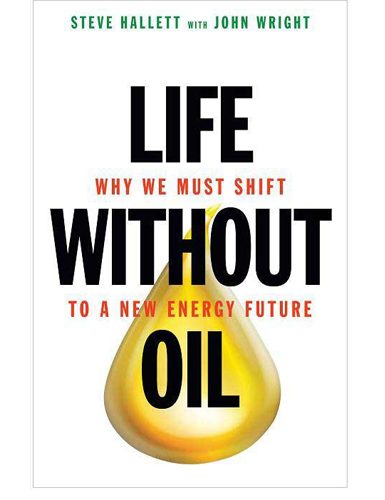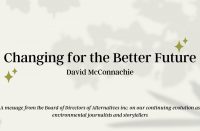Those of us who believe that humans are causing global warming may not notice the growing body of sophisticated denial literature. Al Gore’s recent essay in Rolling Stone Magazine lays out the depressing tale of disinformation and ideologically shielded ignorance that is currently unfolding in the US. “In one corner of the ring are Science and Reason,” writes Gore. “In the other corner: Poisonous Polluters and Right-wing Ideologues.”
Those of us who believe that humans are causing global warming may not notice the growing body of sophisticated denial literature. Al Gore’s recent essay in Rolling Stone Magazine lays out the depressing tale of disinformation and ideologically shielded ignorance that is currently unfolding in the US. “In one corner of the ring are Science and Reason,” writes Gore. “In the other corner: Poisonous Polluters and Right-wing Ideologues.”
The right, however, has no monopoly on denial. In the burgeoning clean-tech field, optimistic literature about green jobs has expanded to fill the space between our desire to protect our creature comforts and our fear of the dragons of collapse. Some say green is a post-partisan issue, and perhaps in Northern Europe’s social democracies it is. But in North America, green still falls to the left of centre.
Given that The False Promise of Green Energy is written by neocon lawyers and economists from the right-leaning Cato Institute, I opened it as I would a bottle of cod liver oil. I hoped that Life Without Oil and Powering the Dream would provide some antidote. These three books approach the future of energy with agendas ranging from the Cato Institute’s business-as-usual philosophy, to Alexis Madrigal’s “clean tech is great business with a long history,” to Steve Hallett’s view that green tech isn’t enough; we need to transform society.
The Cato Institute exists “to counter the trend” of government regulation of free enterprise. Fittingly, The False Promise of Green Energy cautions against public investment in green jobs and clean-tech companies. The authors take an agnostic position on climate change. They avoid any direct reference to the end of cheap oil, putting their faith in the free market. The book should be subtitled “In Defense of Coal.” Their argument? We can’t have our cake and eat it too. Green jobs will make us “pay more to live worse.”
Moreover, they suggest, our environmental woes are exaggerated, and we need not move quickly toward a post-carbon economy. “The world suffers from profound environmental problems,” they affirm. “It always has.” Hmmm. Ancient peoples died from inhaling the smoke from their cooking fires. Do I detect a little cooking smoke and mirrors to distract us from acknowledging the scientific consensus on global heating?
The strength of this book is its deconstruction of the green-job estimates in documents such as the US Conference of Mayors’ 2008 Green Jobs Report and Van Jones’ 2008 book, The Green Collar Economy. They cleverly demonstrate that “the devil is in the details” and that green energy is being sold without dwelling on the bad news: Our lifestyles will have to change radically over coming decades.
But the shortcoming in these projections aside, we still need to revamp the industrial economy. We simply have to do it more transparently. With their phobia of government, the Cato Institute authors appear to have forgotten what it took to mobilize our societies the last time all bets were off – in World War II.
In Life Without Oil, Hallett reminds us that dealing with the environmental crisis before us will require governments to use “a combination of fierce persuasion and potent legislation.” The author doesn’t pull any punches. Hallett writes, “The combined impacts of two centuries of fossil-fuel-powered civilization building, pollution and resource depletion have finally overwhelmed our support systems. It is time to prioritize the retreat.” Then he asks, “What things will be most valuable in the generations to come?”
Hallett must be a popular professor at Purdue University where he teaches. He is lively, direct, knowledgeable beyond his field of botany, and writes with the intent of engaging students in critical thinking. He stands on the shoulders of pioneers in the post-carbon field such as Richard Heinberg, James Lovelock and Howard Kunstler. Perhaps he says nothing new, but Hallett is easy to read. He moves seamlessly from anthropological insights to ecological economics, has a nose for memorable details and spins a good yarn. He offers a personal “History of the World 101” to explain the collision course between human appetites and Earth’s ever-shrinking bounty.
In Powering the [American] Dream, editor of The Atlantic, Alexis Madrigal, sings the praises of capitalism, which, in his opinion, will save us from the material scarcity that comes with peak everything. In his enthusiasm for the utopia of abundance, Madrigal shares the Cato Institute’s distaste for the limits to growth. Madrigal’s champions are men such as venture capitalist John Doerr, who sees clean tech as a way to make lots of money.
Madrigal’s book is written in a lucid, accessible style and offers a great deal of common sense. “Right or wrong, cheap things win, so clean energy has to get cheaper,” he quips, as he mocks the insights of the Club of Rome, referring to them as “hoary truisms.” He nevertheless offers fresh thinking on environmentalism and provides an eye-opening history lesson for green techno-optimists.
The book is worth reading for its stories, such as one about the 1895 competition between electric and internal combustion cars, and another about the brief, intense battle between compressed air and electricity transmission as ways to send power over long distances. He explains that there were six million windmills pumping water on American farms in the late 1800s, some so well designed that they are still operating today.
But Madrigal’s quirkiness shows up in his difficulty with bicycles. According to him, these two-wheeled vehicles have a lot to answer for. Who knew? He suggests that the 10 million bicycles being used in the US at the turn of the 20th century transformed our notion of personal independence and paved the way for private cars. Not only did the bicycle make Americans skeptical of public transit, cyclists enabled cars by lobbying for road improvements across the US. Bicycle repair shops established the model for gas stations and garages, and Henry Ford probably got the idea of mass production from the famous Pope Manufacturing Company, which owned the original bicycle patent.
Madrigal sifts through scenarios of government support for green research and development, identifying both perverse consequences and successes. He does an excellent job of explaining the Danish model of consistent, long-term, flexible government support for clean-tech knowledge and people. His book is a useful primer for intelligent energy policy.
It’s difficult to find a common message in this trio of books on clean tech, but one theme does emerge: It takes a long time for new things to catch on and begin to work. The sooner we get started, the more likely we’ll succeed.
The False Promise of Green Energy, Andrew P. Morriss, William T. Bogart, Roger E. Meiners and Andrew D. Dorchak, Washington, DC: Cato Institute, 2011, 289 pages
Life Without Oil, Steve Hallett, Amherst, NY: Prometheus Books, 2011, 435 pages
Powering the Dream, Alexis Madrigal, Cambridge, Massachusetts: Da Capo Press, 2011, 400 pages
This review originally appeared in Green Buildings, Issue 38.2. Subscribe now to get more book reviews in your mailbox!
Reviewer Information
Producer/writer Chris Lowry works for a convivial post-carbon future. He can be found at ecotone.ca.












